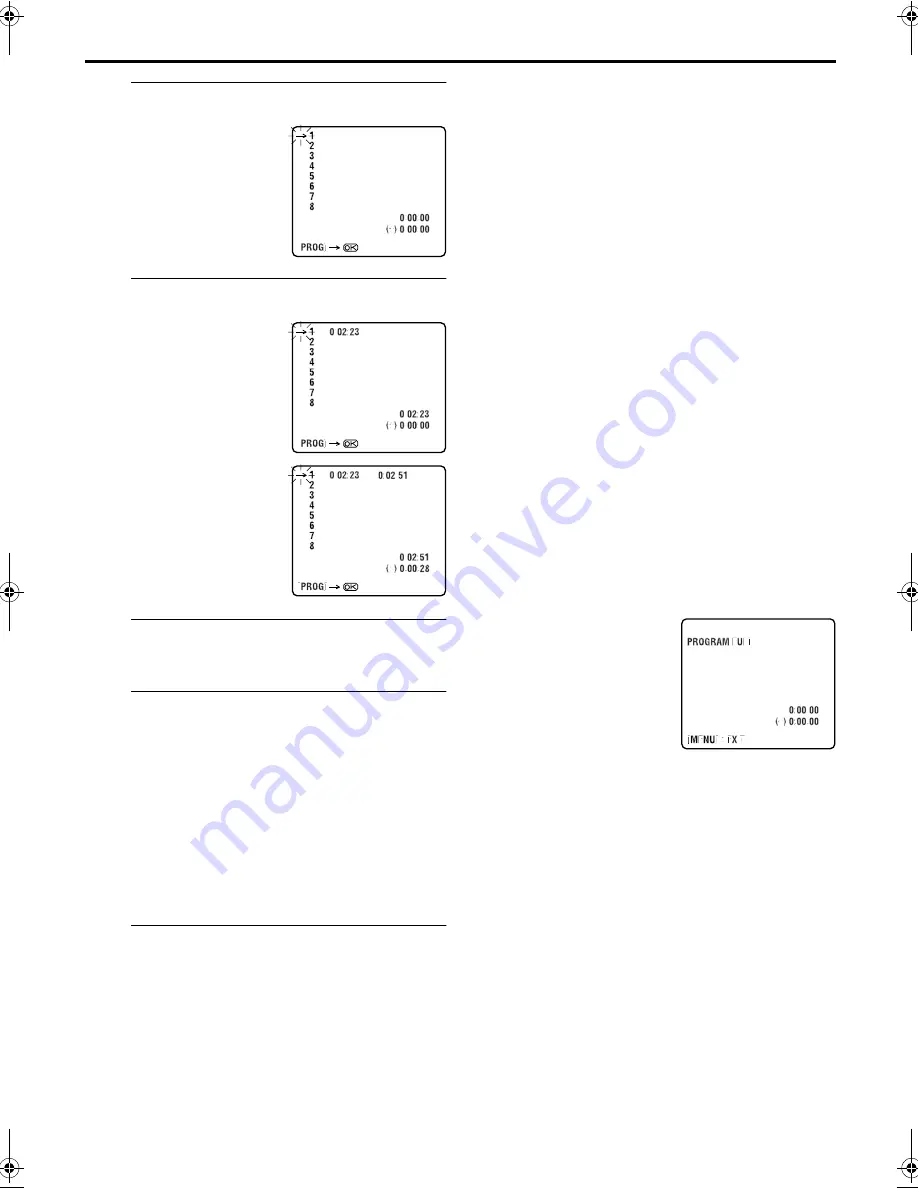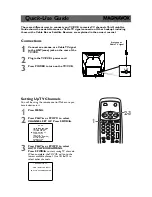
Masterpage:Right-NoTitle0
EN
55
Filename [HRJ880EU3.fm]
Page 55
May 18, 2001 2:45 pm
G
Locate the start point.
H
Locate the end point.
I
Prepare the recording deck.
Engage its Record-Standby mode.
J
Start Random Assemble Editing.
Press
OK
.
●
Automatic editing begins; all the specified scenes are copied
to the recording deck in the order they were registered.
●
The on-screen display remains while your recorder searches
for each scene (blinking cursor indicates scene currently being
searched for), but disappears during actual editing.
●
During scene search, the recording deck automatically enters
its Record-Standby mode.
●
When all registered scenes have been edited, your recorder
enters the Pause mode, the recording deck enters its
Record-Standby mode, and the cursor blinks at the next
available number.
K
End Random Assemble Editing.
Press
MENU
to return to the normal screen, and engage
the Stop mode for your recorder and for the recording
deck.
To Make Corrections ...
... in step
7
or
8
, you can cancel registered in and out points by
pressing
&
. Each time you press, the preceding point is erased.
●
If, for example, you have registered 5 sets of in and out points
and want to reset the first set, you have to press
&
until all
points after the first set have been erased. Reenter them after
you have repaired the first set of points.
NOTES:
●
You can also monitor the sound when searching for scenes you
want to edit in steps
7
–
8
. Since you can hear the soundtrack
during selection, you can avoid abrupt or unnatural sounding
scene-to-scene transitions. The sound that is heard, however,
is not TimeScan Audio.
●
When editing, there may be a discrepancy of about 2 seconds
on the source tape between the locations you chose as edit-in
and -out points and the locations your recorder recognizes as
those points.
●
For any scene, the edit-out point must have a counter reading
that is at least 1 second after the corresponding edit-in point.
Any less than 1 second and the edit-out point will not be
registered.
●
Since the source recorder prerolls during Random Assemble
Editing, there must be at least 15 seconds worth of recorded
material prior to any edit-in point on the source tape.
●
If the search time for an edit-in point exceeds 5 minutes, the
recording deck enters its Stop mode and editing will not take
place.
●
During steps
7
and
8
— if you engage the Pause mode while
registering edit-in and -out points in the R.A.Edit screen, the
characters in the on-screen display may become distorted. This
is normal.
Memory Capacity
Random Assemble Editing shares
memory space with the recorder’s
timer. If there are programmes
occupied by timer-recording
data, those spaces cannot be used
to register edit-in and -out points
— meaning you will not be able
to edit 8 scenes.
●
When all 8 programmes are
full, “PROGRAM FULL”
appears on the R.A.Edit screen.
●
To cancel a programme, see page 32.
RM-V704U Multi-Brand Random Assemble Edit
Controller (Not provided)
By connecting this controller to your recorder’s R.A.EDIT
connector, you can perform Random Assemble Editing in
combination with a second non-JVC video recorder. The
controller is compatible with various major recorder brands. For
compatible systems and availability, please consult your JVC
dealer.
NOTE:
Although the RM-V704U is designed to operate the recording
deck, it may not work with some recorders, or may have limited
function capability.
Find the edit-in point on the
source tape from where you
want the edited scene to
begin by pressing
w
e
or
using the
JOG
dial, then
press
PROG
.
●
The edit-in point is registered
in memory and appears on the
screen.
Find the edit-out point where
you want the edited scene to
end by pressing
w
e
or using
the
JOG
dial, then press
PROG
.
●
The edit-out point is registered
in memory and appears on the
screen.
●
The total time of the edited
scenes is displayed to the right
of “(+)”.
●
Repeat steps
7
and
8
for each
additional scene.
HRJ880EU3.fm Page 55 Friday, May 18, 2001 2:54 PM




































